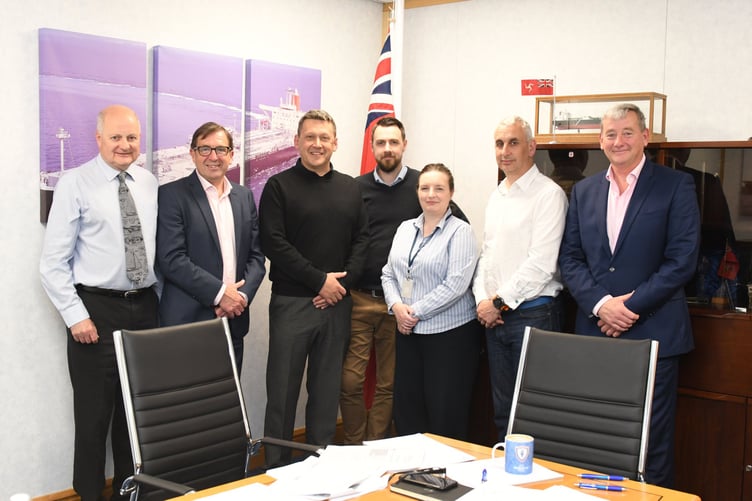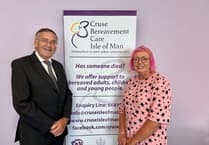The day has not started well for the Isle of Man Ship Registry.
Its principal surveyor, David Gooberman, was woken in the early hours of the morning to be informed that an Isle of Man registered vessel, Energy Puma, has suffered a fire five miles south of Chicken Rock .
This has resulted in a loss of propulsion and steering. It is February, and there is a storm with southerly force 9 winds gusting to 50 / 55 knots, heavy seas and swell, with heavy rain and reduced visibility.
In these conditions Energy Puma is unable to hold her anchoring position and is drifting. By 7.24am she has grounded close to Bay-ny-Carrickey Rocks.
Harbour Control had earlier alerted and deployed a Coastguard team so they were on scene in the Gansey Road area at the time of the grounding. Port St Mary lifeboat has been launched and is close to the scene.
The Coastguard later report sighting of oil at the eastern end of Gansey Beach and on Pooil Vaaish.
At 8.15am Harbour Control is back on the telephone to the Ship Registry to inform them that the Isle of Man-registered Stena Scotia has issued a May Day Call following a major incident on board: she is currently in Ramsey Bay and to the south of the Bahama Bank.
A serious fire on board has resulted in injuries to a crew member and a helicopter has been ordered to take him to hospital.
Then things get even worse as an email is received at the Ship Registry informing them that a third Isle of Man vessel, the container ship Spirit of Singapore, is also in trouble. She has been involved in a grounding off Bluff Point while entering South Port, New Zealand.
Luckily, of course, none of this is real, but part of a training day, taking place in the registry’s board room, devised by corporate risk consultants, Expol.
The idea is to test the Ship Registry’s ability to deal with major incidents involving Isle of Man registered vessels.
The Ship Registry’s team is made up of deputy director, Toby Brooks; David Gooberman; technical policy manager, Martyn Oates and legislation manager Angela Barnett.
Rob Kinrade, managing director of Expol, says: ‘We are contracted to provide investigative services and training to the Ship Registry and as part of this we run a critical incident exercise for them every year.’
Rob has brought with him Dr Brian Chappell who is ex-Metropolitan Police and now a senior lecturer in criminal investigation at the University of Portsmouth, and Mark Bregazzi, a retired senior marine surveyor who used his 21 years of experience working at the Ship Registry to design these scenarios.
‘Things happen at sea,’ says Mark, ‘Some of these scenarios are taken from actual incidents, not necessarily on Isle of Man ships. The third element, happening in New Zealand, is to add in the time difference problem and is quite a usual thing that has happened to ships going in and out of all sorts of ports.
‘I’ve created the Isle of Man incidents because they wanted something more local to find out more about dealing with the media interest side of things.’
And that is why I am here, to ‘interview’ Toby Brooks at several stages along the way, asking the sort of questions that local media would want answers to.
Clearly in the face of scenarios where casualties or environmental damage occur, there is a great deal of local interest and concern. When it comes to Isle of Man registered ships getting into difficulties in other countries around the world then the good standing of the registry, and the island, are also in the spotlight.
Toby says: ‘We’re very much an internationally-facing department of Isle of Man Government and our reputation is paramount in how we operate and how we’re viewed.’
There are around 900 commercial ships, yachts and a fishing fleet on the Isle of Man’s register. When a major incident occurs, the role of the registry is well defined, its procedures tested and refined by the training days like today, which are held regularly.
The registry is not, for example, responsible, for assisting with the release grounded vessels, or towing them into port. This kind of sharp end activity is usually carried out by the local harbour authorities.
The registry has more of a monitoring and advisory role. It will liaise with the vessel’s owners and the local authorities and can help by providing data such as crew lists, which they hold.
Crews of Isle of Man registered ships may be of diverse nationalities but language should not be a problem during these communications as the command of English of key members of the crew is routinely tested as a requirement of registration.
David Gooberman says: ‘These exercises are really useful as they do stretch us. It’s what we do on an operational basis fairly regularly, we do get the call at two o’clock in the morning not too often luckily but it does happen and I’m available. That’s the service we offer being a 24/7 flag because ships operate 24/7 and emergencies aren’t nine to five.’
Rob adds: ‘This was a high pressure day today. There were three incidents on the go, two locally and one in New Zealand, there was an awful lot to take in.’
The registry team has risen to the occasion. By the end of the day, all the vessels have been released and towed into port, the casualty is stable in Noble’s Hospital, and nobody has lost their cool. At the ‘media briefing’ which wraps up the session, I’ve been told to be quite tough with my questions and Toby answers them all well.
Dr Chappell sums up the team’s performance, saying: ‘The engagement and enthusiasm, professionally and diligently approaching these exercises where things can be stress tested, the learning of that is always coming out at these sessions and this can only be of benefit.’
Toby adds: ‘We ask Rob to come in, to put us through our paces and surprise us with scenarios that will test all of us and our decision making. It’s a worthwhile service and an engagement that we look forward to.’




